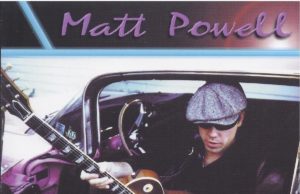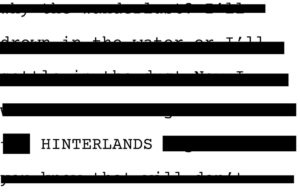Two decades ago, new albums from Jay-Z, Shelby Lynne, Modest Mouse and others were spinning away in my portable CD player. Here’s what I had to say about them back then (with some minor editing):
 Jay-Z
Jay-Z
Vol. 3 … Life and Times of S. Carter
Talk about art imitating life. Midway through his third disc, Shawn (Jay-Z) Carter raps about being under arrest, on trial and facing a lengthy prison term — pretty much the very spot the Brooklyn rapper found himself in after being charged with a stabbing at a New York nightclub late in 1999.
OK, so maybe it doesn’t take Kreskin to predict that a rapper would end up on the wrong side of holding cell bars. Even so, Jay-Z’s legal travails can’t help but colour the way you listen to the new Life and Times of S. Carter. After all, it’s one thing for spoiled millionaire rappers to pretend to live the thug life — Puff Daddy, come on down! — but somehow Carter’s rhymes seem to carry more weight now that he stands accused of the real thing. As he says himself on D’Evils, “I was thought to be a pleasant guy all my f–ing life — and now I’m down for whatever ain’t nice.” No kidding.
But while the 72-minute Life and Times might not be admissible as a confession, it could serve as a deposition of his state of mind. Tracks like the sarcastically titled Lucky Me (“I’m trapped / The whole world’s against me”) and Dead Presidents (“Things I’m involved with got me on pins and needles”) find Carter displaying plenty of paranoia and anxiety along with the usual rap-star boom and bluster. Meanwhile, Come and Get Me, There’s Been a Murder, and Where I’m From — “Thugs are at odds and at each other’s throats … But most times find themselves locked up behind bars, that’s all.” — pretty much speak for themselves. Then, of course, there’s the aforementioned accusation of Dope Man, with Jay-Z taking the stand in his own defence: “Right hand on the Bible / Left hand in the air … I’m a prisoner of circumstance.”
To steal a line from his own Annie-sampling hit single of ’99, it’s a hard knock life. And, if the sad truth be known, it’s also probably a pretty decent marketing tool for Life and Times. Sad because it’s a gimmick Carter doesn’t need. Like its predecessors, Vol. 3 is more than strong enough to hold its own in the marketplace. Carter’s conversational, low-key flow stands out among the bellowing braggadocio of most thug rappers out there. Equally distinctive are his quirky, theatrical jams, which are as likely to feature operetta samples and oddball arrangements as the usual bumptious beats and Jeep-rocking bass, all serving to give a unique spin Carter’s tough tales of thug life, drug life and club life, in which Jay-Z faces down all adversaries and emerges victorious — even in court. In that regard, when it comes to the real, judicial life and times of S. Carter, Jay-Z should hope life imitates art.
 Shelby Lynne
Shelby Lynne
I Am Shelby Lynne
Country singer Shelby Lynne oughta be big. She has the credentials: She’s the daughter of country singers and the sister of Alison Moorer. She’s got the experience: She cut her first single at 18 with George Jones and has recorded five albums, including a swing outing before it was trendy. She’s got the look: Glass-cutting cheekbones, blond curls and rock-star glamour. She’s got the voice: A husky, sensual alto halfway between Sheryl Crow and Bonnie Raitt. She has the tragic origin story: Her father killed her mother and then himself when she was a teen. And most importantly, she’s got the sound: A simple, simply perfect blend of Crow’s roots-pop and Raitt’s folk-blues, underpinned by authentic Memphis soul, Little Feat-style country-rock and the sweeping string balladry of Dusty Springfield. In short: She’s got it all.
 Modest Mouse
Modest Mouse
Building Nothing Out of Something
After two spectacular, critically praised indie releases, these idiosyncratic Seattle rockers have moved on up to a major-label deal with Sony. So, as a going-away present to the band and fans, the label that signed and nurtured them has put together this set of singles, leftovers and tracks previously unavailable on CD. And a wonderful gift it is — a dozen tracks of Modest Mouse’s charmingly shambling, jangling garage psychedelia, with clunky rhythms, slippery slide guitars and co-ed vocals colliding like bumper cars halfway between Pavement’s slanted and enchanted bohemian rhapsodies and Royal Trux’s trippy, ragged glory. Their new CD isn’t due until spring, but this will easily tide you over.
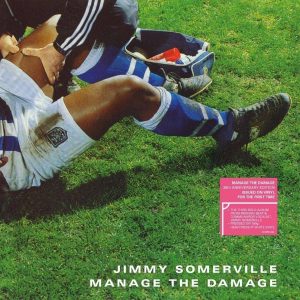 Jimmy Somerville
Jimmy Somerville
Manage the Damage
“Ain’t going down / I intend to hang around,” declares Jimmy Somerville on his new album. Why aren’t I surprised? After all, Somerville — one of pop’s first and most vocally gay performers — is nothing if not a survivor. He stuck it out through the rise and fall of Bronski Beat and Communards. With Manage the Damage, his latest solo effort and first disc in three years, his persistence is paying off. Like the Pet Shop Boys’ latest, Damage finds Somerville discovering life beyond the dance floor, dipping his emotive falsetto in the waters of blue-eyed soul, sultry bump ’n’ grind beats, funky drum and bass and even intimate, folky balladry. Looks like the Small Town Boy has finally grown up.
 Crooked Fingers
Crooked Fingers
Crooked Fingers
Archery is, for all intents and purposes, a solo sport. So it only makes sense that Eric Bachmann — former singer/guitarist of indie-rock pioneers Archers of Loaf — has decided to take the solo singer/songwriter route. But there are still plenty of surprises to be had on his self-titled debut disc as Crooked Fingers. If you’re expecting the guitar-driven garage-punk of, say, Icky Mettle, think again: These 10 invitingly eccentric compositions are closer to a beer-fuelled chamber-folk jam in the hold of a seagoing freighter. As the band churns its way through darkly melancholy melodies graced by violin, cello and lap steel, Bachmann spins warped and winsome tales of old drunks and broken men in a gravelly rasp that gene-splices Tom Waits, Shane MacGowan from The Pogues and Neil Diamond with a very sore throat. Bullseye.
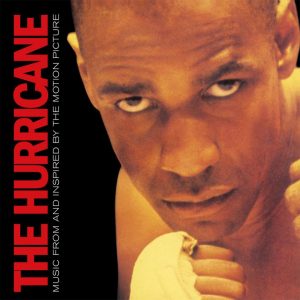 The Hurricane Soundtrack
The Hurricane Soundtrack
Various Artists
Typically, the six worst words you can find on a soundtrack album are “music inspired by the motion picture.” Roughly translated, this means “a whole buncha crap that has nothing to do with the film but sorta sounds similar and came real cheap.” More’s the surprise, then, that the CD for this biopic of boxer Rubin Carter is the rare instance when inspiration truly seems to have struck. Flitting between the ’60s, when Carter was wrongly imprisoned for murder, and the ’90s, when he finally enjoys freedom, Hurricane bobs and weaves from the Afrocentric grooves of Gil Scott-Heron (The Revolution Will Not be Televised) and soul of Ray Charles (Hard Times No One Knows) to new, thematically sound hip-hop from the likes of Me’Shell NdegéOcello (the darkly funky Isolation) and Melky Sedeck (the gospel-tinged ballad Still I Rise). And of course, you get Bob Dylan’s classic Hurricane, which still packs all the emotional punch it did 20 years ago. An unexpected knockout.
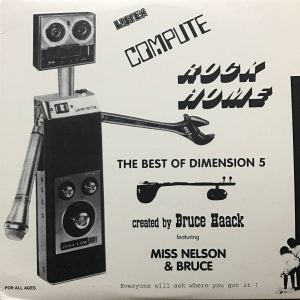 Bruce Haack
Bruce Haack
Listen Compute Rock Home
Sometimes, the best kids’ music isn’t necessarily for kids at all. Bend an ear to this wonderfully bent offering from undersung Canadian composer Bruce Haack and see what I mean. During the ’60s and ’70s, the Alberta-born, Juilliard-trained pianist created what must be the freakiest children’s albums in existence — something akin to what you’d get if Kraftwerk, The B-52’s and Frank Zappa were the musical directors of Sesame Street. This CD samples the quark, strangeness and charm of the late genius’s long-lost lo-fi works: 15 whimsical, educational ditties populated by eagles, army ants, robots and talking coconuts, set to an eclectic mish-mash of styles — from mutant bluegrass to James Brown funk — and played on Haack’s primitive, home-made arsenal of burping, squirting, squealing synths. It speaks to the kid in all of us.
 Dieter Moebius
Dieter Moebius
Blotch
If you dig Moby, thank Moebius. Back in the ’60s, as a member of influential avant-rock trio Kluster, he helped found the so-called Krautrock sound, which begat Kraftwerk, which begat electronica as we know it. But while Dieter has kept a comparatively low profile over the years, he’s never stopped working — Blotch is his 32nd album in his three-decade recording career. And it’s another miracle of German engineering — nearly an hour of ice-cool assembly-line grooves and cruise-controlled Autobahn beatboxes, punctuated by the occasional clattering effect, grunting synthesizer and gliding strings. There are no funky samples, no jarring scratches, no raps — just musical minimalism whose beauty lies partly in its efficiency and restrained precision. Blotch is certainly no blemish on Moebius’s spotless record.
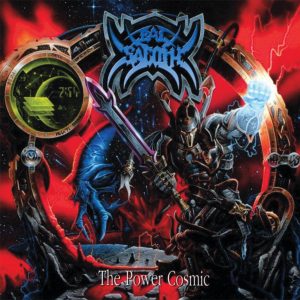 Bal-Sagoth
Bal-Sagoth
The Power Cosmic
If there’s one thing this Euro-metal outfit knows how to do, it’s write song titles. Just check out some of these babies: Of Carnage and a Gathering of the Wolves. The 13 Cryptical Prophecies of Mu. Or my personal fave: Behold, the Armies of War Descend Screaming from the Heavens! Could any song live up to a handle like that? Well, maybe. But sadly, none of these manage to. Titles like those demand shrieking guitars, jackhammer drums and brain-crushing waves of sonic holocaust; what you get is bombastic, theatrical prog-metal with grand orchestral themes, plenty of strings and sweeping sword ’n’ sorcery storylines with gods, stars, empires and wizards. Sure, it’s good — but when you’re trying to do justice to a tune called The Scourge of the Fourth Celestial Host, good just isn’t good enough.
 Sinner
Sinner
The Second Decade
Second decade? Heck, I didn’t know there was a first one. Fortunately, if you’re as out of the loop on this as us, this compilation is a good way to get up to speed on this old-school European metal quintet. And I do mean old-school: Singer/bassist Matt Sinner — is that a great rock ’n’ roll name, or what? — and his cohorts still crank out the same kind of ’80s riff-rock that hasn’t been heard on these shores since Faster Pussycat gave up the ghost. They’ve got the catchy, chorus-friendly song titles (Born to Rock, Jump the Gun), the Van Halen dive-bomb fretwork, the galloping double-bass drums, and vocals that sound like a duet between Axl Rose and Blackie Lawless. Extra points for the silver lamé CD cover (a la KISS’s Double Platinum) and the smoking cover of Accept’s Balls to the Wall. See you in the third decade.
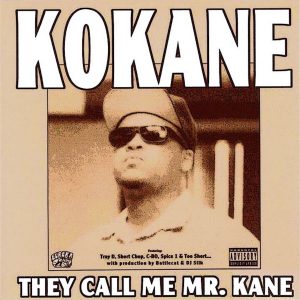 Kokane
Kokane
They Call Me Mr. Kane
This former member of Compton rap outfit Above the Law was a protege of Eazy-E. But on the funky and formidable They Call Me Mr. Kane, his first solo album since 1994, he owes as much of a debt to P-Funk as to N.W.A. Showing off his songwriting roots — he’s the son of Motown tunesmith Jerry Long — Kokane raises the bar by nailing his foul-mouthed gangster rhymes to a solid gold foundation of nimble R&B, funk and hip-hop, with plenty of low-riding bottom end, rubber bass lines and multi-layered, flowing jams that never fail to get down on the one. “Ain’t nothing but a gangsta melody, y’all!” boasts Kokane. Ain’t nothing but a party, either.
 Jayo Felony
Jayo Felony
Underground
Old-school rap of a different stripe: These tracks by L.A. rhymer Jayo Felony were recorded several years ago. Why are they just coming out now? Well, maybe Jayo’s move on up to major label Def Jam a while back has something to do with it. But even if it is a cash-in, Underground isn’t a total write-off. True, these garden-variety West Coast G-funk outings aren’t exactly groundbreaking — it’s no wonder a tune called Cop Killer stayed in the can for years — but Jayo’s motor-mouthed verbal gymnastics verify that he was destined for better things. Underground is for fans only.
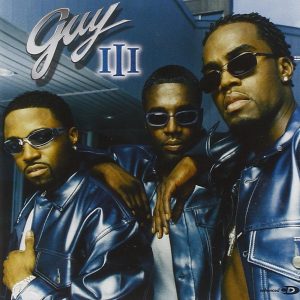 Guy
Guy
III
If you believe record company press releases — and I always do — new jack swing pioneer Teddy Riley broke up his trio Guy a decade ago not to go solo, but as an elaborate ruse to extricate the group from the clutches of unscrupulous managers. Whatever; frankly, I suspect anybody who still cares about Guy is more interested in what the story is with their new tracks. Simply put, it’s a romance novel. Unlike the hard-edged, neck-snapping vibe of Riley’s more recent work with BLACKstreet, Guy III is a mellower, soulful collection with a beating heart and a lover-man vibe. The midtempo grooves are slick and slinky, the funk is restrained and tight. When they want to — like on perennial fave Teddy’s Jam — Guy still get jiggy with it. But like the old hands they are, III finds the boys more comfortable as smooth operators.
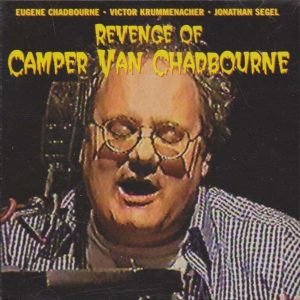 Camper Van Chadbourne
Camper Van Chadbourne
The Revenge of Camper Van Chadbourne
There are supergroups and then there are super freaky groups — this time-to-time teaming of two former members of psychedelic indie-roots outfit Camper Van Beethoven and alt-folk demento Dr. Eugene Chadbourne is definitely the latter. Cult fave Chadbourne, with his political-satire lyrics and untethered musical aesthetic, is sort of a cross between Woody Guthrie and early Frank Zappa. Not to mention that he plucks the banjo like somebody cranking a jack-in-the-box way too fast. Luckily, fiddler Jonathan Segel and guitarist/bassist Victor Krummenacher are around to keep his balloon from getting away and flesh out his skeletal, Appalachian-mutation ditties into oddly elegant chamber-folky works of depth, darkness, dementia and desperation. Revenge is sweet.
 Jackie (The Joke Man) Martling
Jackie (The Joke Man) Martling
Come Again?
Mike Bullard
Stick to Comedy
“ … wrecked him? Damn near killed him! Ha! Bada boom! Welcome to the Chuckle Hut, folks. Tonight’s double-bill is a study in comic contrast — traditional vs. contemporary, rehearsed vs. improvised, dirty vs. clean. The former descriptions all apply to New Jersey’s Jackie Martling, a Howard Stern sidekick and humour writer for Penthouse. They call him The Joke Man; Joke Machine is more like it. Martling knows every old, dirty, racist, politically incorrect joke ever written, and spews out several hundred of them as fast a Gatling gun, barely pausing for breath between rim shots. Here’s one of the few I can repeat: ‘Why did the woman take LSD with her birth control pills? So she could take a trip without the kids.’ Bada-bing! If that’s your shtik, he’ll leave you groaning and busting a gut at the same time. Those who prefer something a little calmer should try Canadian talk show vet Mike Bullard, Martling’s exact opposite. Bullard doesn’t know from jokes; his act pretty much consists of heckling the crowd like a kinder, gentler Don Rickles {“You make furniture for Ikea? Nobody makes furniture for Ikea!”) Sure, he’s fast on his feet. But it doesn’t excuse his fabulously unfunny sketches and lame attempt at rap. Don’t be dumb; stick to standup, Mike! Which reminds me: My wife is so dumb I took her to one of those all-you-can-eat soup and salad places, and she had two bowls of creamy Italian! But seriously, folks … ”
 Briggan Krauss
Briggan Krauss
Descending to End
Usually, when I hear the words “improvised avant jazz,” I reach for the earplugs. Not so with New York electronicist and saxophonist Briggan Krauss. Unlike the clattering cacophony that typically passes for free jazz these days, Krauss’s work is a marvel of subtlety and texture. Beginning with a canvas of improvised electronica — blooping synths, scuttling percussion, echo and reverb manipulations — he dabs on splashes of colour with his alto horn, bits of percussion and even turntable scratching. Sure, sometimes his artsy constructs resemble someone pounding nails with a cymbal into an old radio while a foghorn goes off in the background. But other times it’s the siren song of aliens communicating with whales. Now and then it even rocks, like the Jesus Lizard stomp on Encumbrance Essence, or soothes, like the Lucy in the Sky harpsichord of Flu Coasting. But it’s never less than ear-opening.
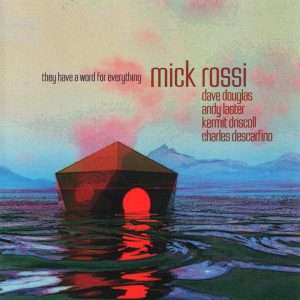 Mick Rossi
Mick Rossi
They Have a Word For Everything
Like plenty of serious musicians and composers, pianist and percussionist Mick Rossi has done his share of dues-paying (not to mention rent-paying) gigs with rockers like Jewel, Pete Townshend, Ry Cooder, Annie Lennox and the like. For a change, he takes centre stage on They Have a Word For Everything, leading a crack quartet — trumpet, sax, bass and drums — through a dozen of his own compositions, which are as varied as his resumé. With a preference for moody, layered progressions, Rossi combines bits of driving post-bop, tinges of classical melody, handfuls of minor chords, creating tension with his clanging, percussion keyboard style and the sophisticated interplay of his musicians. Many of these tracks could easily serve as the score to an espionage thriller. If only he could pay the rent with this stuff. Jewel’s loss would definitely be our gain.
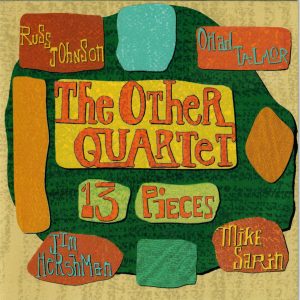 The Other Quartet
The Other Quartet
13 Pieces
Given the title of this disc, it’s probably safe to assume this New York jazz foursome isn’t a superstitious bunch. And why should they be? Their luck is holding out pretty well so far. The quartet — playing sax, trumpet, guitar and drums — have one foot in the traditional field of written tunes and the other in the anything-goes realm of improvisation. Here, you get the best of both worlds — and without any seams. Presumably beginning with at least partial arrangements, the Other guys jam their way through these baker’s dozen grooves live in the studio, roaming with ease from funky syncopation to breezy jazz to Zappaesque kookiness to frenzied bop, always landing on their feet as surely as a cat. No wonder they’re so karmically confident; one listen tells you there’s no luck at work here — just skill, inspiration and perspiration.
 Enigma
Enigma
The Screen Behind the Mirror
You know, there’s a fine line between the genius of a composer like Vangelis and the shoddiness of a New Age cheese merchant like John Tesh. With his intellectually artsy approach and ambitiously complex constructions under the handle Enigma, Romanian Michael Cretu obviously hopes to be filed in the former category. Too bad his self-help bumper-sticker lyrical drivel — “Don’t submit to stupid rules / Be yourself and not a fool” — and penchant for tackily overblown arrangements and bombastic neo-classical pomp plunk him squarely in Yanniville. The only riddle wrapped inside this enigma is how Cretu has been able to come up with four albums of this glop.
https://youtu.be/gWFSIwh0-Ao
 Takako Minekawa
Takako Minekawa
Fun9
First things first: No matter what your eyes tell you, this album is not called Fun Nine — it’s Funk, according to the press bumpf. Don’t sweat; I don’t get it either. What’s easier to grasp, however, is how Takako Minekawa has become the latest toast of the Japanese electro-pop world. It comes down to three words: Songwriting, songwriting, songwriting. While many of her contemporaries are obsessed with the zippy sugar rush of ’60s go-go, Minekawa draws upon a wider palette of influences — indie-pop, quirky funk, Close Encounters-style bleep-bloops, even the doot-de-doo backups from Lou Reed’s Walk on the Wild Side — to give her eclectic electronica extra layers of colour, shade and texture to bolster her airy, sing-songy vocals. In other words, she’s more Cibo Matto than Pizzicato 5. At least, that’s what my ears tell me.
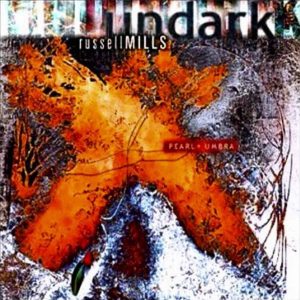 Russell Mills / Undark
Russell Mills / Undark
Pearl + Umbra
When I say eclectic composer Russell Mills is a cover guy, I don’t mean he plays other people’s songs. In his day gig, Mills is a visual artist — he designed the CD book for Nine Inch Nails’ Downward Spiral, and has decorated discs for Brian Eno, Robert Fripp, Miles Davis, David Sylvian and the like. Stepping from the artist’s studio to the recording studio for this second solo CD, he works the Rolodex and calls in a few favours, enlisting the support of Eno, Peter Gabriel, Bill Laswell and Sonic Youth’s Thurston Moore. Not surprisingly, what ensues is an artsy affair. Instead of tunes, Pearl + Umbra is like a gallery, displaying a dozen varied sonic sculptures — electronic drones, jazzy trip-hop, muted industrial, snappy funk — built from sinewy basslines, bold sweeps of cinematic synthesizers, the occasional icy, esoteric vocal from the likes of Emma Townshend. I may not know art, but I know I like it. Oh yeah, the cover art is pretty cool, too.
https://youtu.be/z2jJp03JtDQ

































